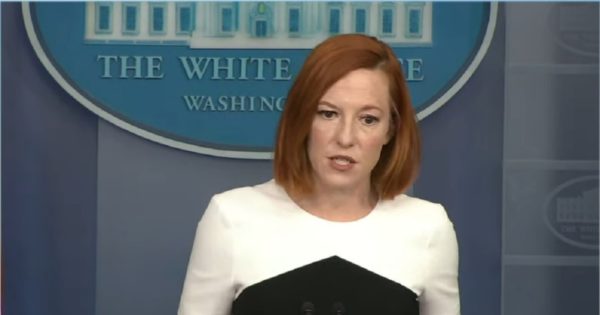STATEMENT BY THE INTERNATIONAL CAMPAIGN FOR TIBET:
The Biden administration’s decision to impose a diplomatic boycott on the 2022 Beijing Winter Olympics is the right choice both morally and strategically. By taking this action, the United States has placed itself on the right side of history and sent a crucial message of support to Tibetans, Uyghurs, Mongols, Hong Kongers and other victims of the Chinese government’s oppression. The rest of the world must now follow the US’ lead, and the IOC must take accountability for its horrendous decision to award the Games to China in the first place.
In addition, the Biden administration must follow up on its diplomatic boycott by appointing a special coordinator for Tibetan issues in the State Department, as mandated by law; engaging with the Dalai Lama and Central Tibetan Administration; and pushing China to resume direct negotiations with Tibetan leaders, among other vital steps.

White House Press Secretary Jen Psaki discusses the US diplomatic boycott of the 2022 Beijing Winter Olympics at a press briefing on Dec. 6, 2021.
Increased repression since 2008 Olympics
In 2008, the International Olympic Committee and China both highlighted the positive impacts that hosting the Olympics that year would have on Chinese society. Contrary to their claims of positive changes in China, the Chinese Communist Party instituted increasingly authoritarian policies after the Olympics. Rather than the Games helping to open up China, the opposite happened; Tibet, for example, became even more deeply cut off from unfettered and uninhibited access by outsiders.
After the 2008 Games, the IOC and the international community moved on, and there wasn’t a substantial call for an independent investigation into the numerous reports of killings in Tibet in March and April 2008.
To this day, serious human rights violations, such as torture and ill-treatment, arbitrary detention and disappearance, and drastic interventions into religious and cultural life continue to take place in Tibet. Repressive political campaigns, institutional racism and long-term policies marginalize Tibetans economically, threaten the survival of the Tibetan identity, and cause tension and ill-will between the Chinese and Tibetan peoples.
After the 2008 experience, and now in light of the 2022 Winter Olympics in Beijing, Tibetans, with greater urgency, have called for an accountable and responsible international Olympic movement.
In February 2021, ICT joined a call by a coalition of more than 180 civil society organizations for governments to commit to a diplomatic boycott of the Games.
In addition, a new briefing paper from ICT documents how the Chinese government escalated its repression in Tibet after hosting the 2008 Olympics. “Olympic Descent: Repression in Tibet since Beijing 2008” is a valuable tool for anyone researching, reporting on or responding to the 2022 Winter Olympics in Beijing.
Responsibility of IOC
In 2017, the IOC added human rights requirements aligned with the UN Guiding Principles on Business and Human Rights in its host city agreements. Those principles provide for entities to undertake human rights due diligence. Although Beijing was awarded the contract to host the Winter Olympics before the new human rights language was adopted, “Operational Requirements” included since then allow the IOC to negotiate for human rights protections and standards with the host city. Such due diligence has not been undertaken by the IOC.
The IOC, having awarded the 2022 Olympics to Beijing, now has a clear obligation to verify that China abides by its code of ethics and commitments.
ICT calls on other governments to join the United States in a diplomatic boycott of the Olympic Games in Beijing in 2022 and to press national Olympic committees and the IOC to raise human rights concerns with the Chinese government, and to publicly address them.
ICT also reiterates its calls on:
- Corporate sponsors to call on national Olympic committees and the IOC to raise human rights concerns with the Chinese government, and to publicly address them, and to consider withdrawing their sponsorship of the 2022 Games, in order to comply with principles according to the UN Global Compact, if national Olympic committees and the IOC do not respond adequately to this call.
- Independent media to be sensitive in their reporting about the 2022 Games, in particular with regard to the representation of the human rights and political situation in Tibet, East Turkestan (also known as Xinjiang), Hong Kong or any other area of internal conflict.

